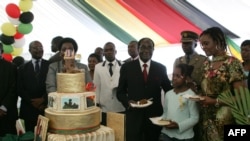HARARE —
The U.S. government has called on the government of Zimbabwe to ensure that uniformed police forces act professionally as the African country prepares to hold elections. Visiting U.S. officials say credible elections could result in Washington lifting economic sanctions on the African nation’s leadership.
U.S. Deputy Assistant Secretary of State in the Bureau of African Affairs, Reuben Brigety, told journalists in Harare on Friday that Zimbabwe's government has improved the lives of its citizens over the past four years. He said continued progress could mean the lifting of U.S. economic sanctions against the country's leaders.
However another visitor, Deputy Assistnat Secretary of State for Human Rights and Development, Karen Hanrahan, said the Obama administration was worried about some recent actions which might reverse all the gains which have been made in Zimbabwe.
“The United States is concerned by emerging trends that put the progress Zimbabwe has made at risk," said Hanrahan. "As we get closer to elections, some are attempting to push the country back into the vicious cycle of intimidation, violence and instability.”
The visit by U.S. officials to Zimbabwe coincided with reports of police raiding civic organizations’ offices and confiscating materials that include radios meant to be distributed to people in rural areas.
Hanrahan said the United States was aware of this reported intimidation by Zimbabwe's army and police.
“These patterns demonstrate clear efforts to manipulate the rule of law and the electoral playing field," she said. "If they continue, it will be difficult to consider the electoral environment conducive to a process consistent with SADC [Southern African Development Community] election standards that yields a clear and legitimate winner. The United States looks to Zimbabwe’s leaders to rectify these trends and to allow the people the opportunity to exercise their rights to self-determination and freedom from fear.”
Zimbabwe is expected to hold elections in mid-2013, assuming voters approve a a proposed new constitution in a March 16 referendum. The elections will end the current power-sharing government of President Robert Mugabe and Prime Minister Morgan Tsvangirai formed in 2009, after disputed and violent elections the previous year.
Asked when Washington would lift sanctions on Mugabe and some ZANU-PF party officials, Brigety outlined what must be achieved before that happens.
"The United States is prepared to meet action for action as a result of positive developments here on the ground," said Brigety. "The nature of our sanctions policy are unlikely to be changed unless and until three of those benchmarks have been met positively. First; a peaceful referendum, secondly the series of steps between the referendum and the election and finally what we hope will be a credible and non-violent election."
The United States and many other Western countries slapped Mugabe and some of his political allies with travel bans and banking freezes beginning in 2002, after reports of human rights abuses and the rigging of that year's election.
The European Union lifted some of those sanctions this week, and said it would review the rest if there are credible elections this year.
U.S. Deputy Assistant Secretary of State in the Bureau of African Affairs, Reuben Brigety, told journalists in Harare on Friday that Zimbabwe's government has improved the lives of its citizens over the past four years. He said continued progress could mean the lifting of U.S. economic sanctions against the country's leaders.
However another visitor, Deputy Assistnat Secretary of State for Human Rights and Development, Karen Hanrahan, said the Obama administration was worried about some recent actions which might reverse all the gains which have been made in Zimbabwe.
“The United States is concerned by emerging trends that put the progress Zimbabwe has made at risk," said Hanrahan. "As we get closer to elections, some are attempting to push the country back into the vicious cycle of intimidation, violence and instability.”
The visit by U.S. officials to Zimbabwe coincided with reports of police raiding civic organizations’ offices and confiscating materials that include radios meant to be distributed to people in rural areas.
Hanrahan said the United States was aware of this reported intimidation by Zimbabwe's army and police.
“These patterns demonstrate clear efforts to manipulate the rule of law and the electoral playing field," she said. "If they continue, it will be difficult to consider the electoral environment conducive to a process consistent with SADC [Southern African Development Community] election standards that yields a clear and legitimate winner. The United States looks to Zimbabwe’s leaders to rectify these trends and to allow the people the opportunity to exercise their rights to self-determination and freedom from fear.”
Zimbabwe is expected to hold elections in mid-2013, assuming voters approve a a proposed new constitution in a March 16 referendum. The elections will end the current power-sharing government of President Robert Mugabe and Prime Minister Morgan Tsvangirai formed in 2009, after disputed and violent elections the previous year.
Asked when Washington would lift sanctions on Mugabe and some ZANU-PF party officials, Brigety outlined what must be achieved before that happens.
"The United States is prepared to meet action for action as a result of positive developments here on the ground," said Brigety. "The nature of our sanctions policy are unlikely to be changed unless and until three of those benchmarks have been met positively. First; a peaceful referendum, secondly the series of steps between the referendum and the election and finally what we hope will be a credible and non-violent election."
The United States and many other Western countries slapped Mugabe and some of his political allies with travel bans and banking freezes beginning in 2002, after reports of human rights abuses and the rigging of that year's election.
The European Union lifted some of those sanctions this week, and said it would review the rest if there are credible elections this year.
